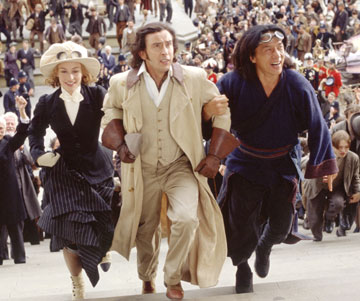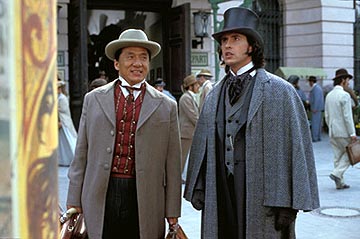

The high point in Around the World in 80 Days is something that most people will miss completely. As the protagonists near the end of their journey, they are stuck in China. Passepartout (Jackie Chan, The Medallion, Shanghai Knights) is in danger, and Chinese legend Wong Fei Hung (Sammo Hung, Red Trousers, Hidden Enforcers) steps in to lend a hand. Chan and Hung often worked together earlier in their careers, and the prospect of them in a fight scene together is salivating. This comes really close to happening, then doesn't. This pretty much sums up Around the World in 80 Days. It is a series of missed opportunities, never good, and just on the edge of being bad. Like the 1956 adaptation of the classic Jules Verne novel, the movies is chock full of celebrity cameos. But the 1956 version had cameos from the likes of Buster Keaton, Frank Sinatra, Red Skelton, Marlene Dietrich, and others, while this version has Macy Gray, Luke and Owen Wilson, Rob Schneider, Kathy Bates, and, most notably, a pre-governator Arnold Schwarzenegger.
It also curiously matches Chan with Steve Coogan (Coffee and Cigarettes, 24 Hour Party People). Both are good at what they do; Chan as a martial artist and physical comedian, and Coogan as a dry comedian, but this film wastes their talents. Try as he may, Chan will never be a good actor. He never comes across as convincing in his roles, English or Cantonese. And, as he gets older, he is now using wires and other sorts of assistance in his stunts, which takes away the very reason people like him. Coogan fares better. As inventor Phileas Fogg, Coogan is good at sounding annoyed, and looking, well, prissy and British. Beyond that, the script defines him as a loner, who will learn to rely on others and get his head out of his books and into the world. It's never too convincing.
The concept is familiar, Lord Kelvin (a wasted role for Jim Broadbent, Nicholas Nickleby, Vanity Fair) challenges Fogg to travel the world in eighty days or less. If he loses, Fogg agrees to never invent again. He has a history of coming up with weird contraptions that never work, so the only person who believes him is Passepartout. Passepartout also wants to hitch a ride to China to return a precious artifact to his ancestral village. In essence, Passepartout is lying to Fogg because he thinks Fogg is the quickest way back to China. Also along for the ride is Monique La Roche (Cecile de France, L'Auberge Espagnole, Kaena: The Prophecy), a French artist. Tailing them are some bumbling British police and a mysterious Asian woman. Screenwriters David Titcher (Home Front), David Benullo (Cupid) and David Goldstein turn Jules Verne's novel into a quick travelogue featuring quick cameos by second tier celebrities.
The worst aspect of Frank Coraci's (The Waterboy, The Wedding Singer) direction is the lack of humor, wonder, or any other emotion except boredom. The various locations look colorful and exotic enough (albeit they all look like the come from stock studio sets), but the joy that Fogg feels at his newfound freedom is conspicuously missing. Instead, he complains his way through most of the film. In another film, this would be funny. In Around the World in 80 Days, it becomes grating. It took years of preproduction before filming actually started, and even worse, no major studio would pony up the money for filming. Instead, Walden Media, a company that focuses primarily on family fare, self-financed the film. The fact that no studio was willing to invest is a bad sign. Disney finally bought the completed movie, and is releasing it, thus minimizing any potential losses if (more likely when) the film flops.